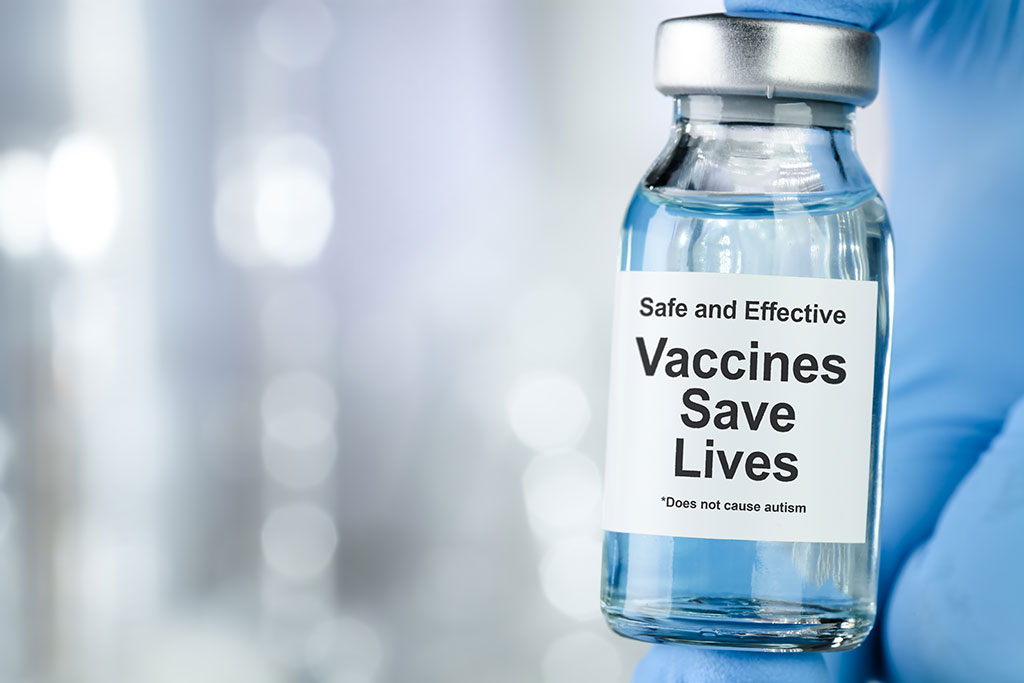
SciCheck Digest
The COVID-19 vaccines available in the U.S. were found to be safe and effective in clinical trials and real-world conditions. Dr. Anthony Fauci did not admit that “Covid Vaccines May Actually Make People ‘Worse,’” as a viral headline misleadingly claims. Fauci’s March 2020 remarks about testing future vaccines for potential safety issues were taken out of context.

Full Story
In a livestreamed interview in March 2020, Meta Platforms CEO Mark Zuckerberg and Dr. Anthony Fauci, director of the National Institute of Allergy and Infectious Diseases, discussed the coronavirus pandemic, including testing potential vaccines against the COVID-19 disease for safety and effectiveness. But one of Fauci’s answers from that 21-month-old interview, before Facebook was rebranded as Meta in October 2021, has been lifted out of context to give the false impression that he recently said the vaccines that have since been approved and authorized for use would do more harm than good.
The misleading headline of a Dec. 14 story published on TrendingPolitics.com reads, “Dr. Fauci Admits That Covid Vaccines May Actually Make People ‘Worse’: ‘It Would Not Be The First Time.’”
 “Dr. Anthony Fauci sat down with ‘Meta’ CEO Mark Zuckerberg and finally said out loud what many people have been warning for over a year about the rushed mRNA vaccines: They may actually make the Covid pandemic worse,” wrote Kyle Becker, the author of the story, which has been shared more than 3,500 times on Facebook alone, according to CrowdTangle data. Similarly, misleading claims have been made on Twitter.
“Dr. Anthony Fauci sat down with ‘Meta’ CEO Mark Zuckerberg and finally said out loud what many people have been warning for over a year about the rushed mRNA vaccines: They may actually make the Covid pandemic worse,” wrote Kyle Becker, the author of the story, which has been shared more than 3,500 times on Facebook alone, according to CrowdTangle data. Similarly, misleading claims have been made on Twitter.
“Dr. Fauci was commenting on a recent study that showed that the Covid vaccines may actually make a recipient more likely to be reinfected than someone with natural immunity from a prior infection,” Becker wrote. “‘This would not be the first time, if it happened, that a vaccine that looked good in initial safety actually made people worse,’ Fauci said,” according to the article, which included a mere 26-second snippet that takes Fauci’s remarks out of context.
But Becker presents a distorted picture of when Fauci made his remarks and what he said at the time about testing future COVID-19 vaccines, which was before the clinical trials showed the vaccines are safe and effective.
As we said earlier, the interview was livestreamed on Facebook in March 2020 — not recently, as the article suggests. Also, Fauci and Zuckerberg never discussed a “recent study” comparing COVID-19 vaccine-induced immunity to natural immunity. It would not have been possible for such a study to have been performed or completed at the time Fauci made his comments nearly two years ago.
(Disclosure: FactCheck.org is one of several organizations working with Facebook to debunk misinformation shared on social media.)
Fauci, Zuckerberg Discuss the Pandemic
In the part of the interview referenced in the Trending Politics story, Zuckerberg had asked why health officials might hesitate to “aggressively” push a safe vaccine even if the effectiveness of the vaccine was unknown. In his response, Fauci continued to emphasize the importance of conducting clinical trials to determine vaccine safety before distribution. Fauci cited examples of vaccine candidates for other viruses, such as HIV and respiratory syncytial virus, that were found to be harmful during the evaluation process.
Here is a transcript of that portion of the nearly 38-minute interview, which begins at about the 22-minute mark of the video embedded below. We highlight the 26-second clip in the transcript but include the full question and answer for proper context.
Zuckerberg, March 19, 2020: So, one of the questions I’ve heard from a number of people is — doing the safety trials obviously is incredibly important because you want to ensure that you’re not injecting people with something that could be harmful. But once you have that, why not push harder on rolling it out more aggressively, even if you don’t know exactly how effective it is? What’s the public health rationale and thinking behind needing to prove that it’s extremely effective before rolling out something that you know is safe?
Fauci: Okay, that’s a good question. The initial safety study, Mark, is to see if I inject it in the arm, does it have some sort of idiosyncratic or bad reaction? There’s another element to safety, and that is: If you vaccinate someone and they make an antibody response, and then they get exposed and infected, does the response that you induced actually enhance the infection and make it worse?
And the only way you’ll know that is if you do an extended study not in a normal volunteer who has no risk of infection, but in people who are out there in a risk situation. This would not be the first time, if it happened, that a vaccine that looked good in initial safety actually made people worse. There was a history of the respiratory syncytial virus vaccine in children which, paradoxically, made the children worse. One of the HIV vaccines that we tested several years ago actually made individuals more likely to get infected.
So, you can’t just go out there and give it unless you feel that, in the field, when someone is getting infected and exposed, being vaccinated doesn’t make them worse. That’s why you’ve got to do a trial.
Importantly, Fauci said “you’ve got to do a trial” first, and “if it happened” that the vaccines “actually made people worse,” it “would not be the first time.”
That is not an admission that the Pfizer/BioNTech, Moderna and Johnson & Johnsonvaccines, which all underwent rigorous clinical trials, make COVID-19 worse, as the story could lead readers to believe. Instead, Fauci was talking about a hypothetical situation prior to the completion of the trial phase and the subsequent authorization and approval of the COVID-19 vaccines.
Antibody-dependent enhancement of disease, as Fauci alluded to in the interview, and as wehave written about, occurs when a previous infection or vaccination generates antibodies that don’t neutralize the virus but instead enhance the virus’ ability to infect cells. It can lead to a worse illness instead of preventing illness as intended.
For example, as Fauci mentioned, clinical trials in the 1960s revealed that children who were given a vaccine for respiratory syncytial virus, or RSV, were more likely to develop or die from pneumonia after an RSV infection, as the Children’s Hospital of Philadelphia says on its page answering questions about antibody-dependent enhancement. The revelation led researchers to end the trials and the vaccine was not submitted for approval or made available to the public, the hospital wrote.
However, physicians and other medical experts we interviewed earlier this year told us there have been no signs of the COVID-19 vaccines causing disease enhancement.
“Neither COVID-19 disease nor the new COVID-19 vaccines have shown evidence of causing ADE. People infected with SARS-CoV-2, the virus that causes COVID-19, have not been likely to develop ADE upon repeat exposure,” the CHOP page on ADE also says. “Likewise, studies of vaccines in the laboratory with animals or in the clinical trials in people have not found evidence of ADE.”
The Centers for Disease Control and Prevention reported that, as of the end of November, more than 459 million doses of the COVID-19 vaccines were administered in the U.S., and only in “rare cases” have people who were immunized “experienced serious health events.” We have noted some of those less common reactions in our vaccine safety digests.
Editor’s note: SciCheck’s COVID-19/Vaccination Project is made possible by a grant from the Robert Wood Johnson Foundation. The foundation has no control over FactCheck.org’s editorial decisions, and the views expressed in our articles do not necessarily reflect the views of the foundation. The goal of the project is to increase exposure to accurate information about COVID-19 and vaccines, while decreasing the impact of misinformation.
Sources
Meta (@Meta). “Watch Live: Dr. Anthony Fauci, the US’s top infectious disease expert, talks to Mark Zuckerberg about what we can do to help fight the spread of the coronavirus (COVID-19).” 19 Mar 2020.
Becker, Kyle. “Dr. Fauci Admits That Covid Vaccines May Actually Make People ‘Worse’: “It Would Not Be The First Time.” TrendingPolitics. 14 Dec 2021.
Fichera, Angelo. “Texas Doctor Spreads False Claims About COVID-19 Vaccines.” FactCheck.org. 26 Mar 2021, updated 23 Aug 2021.
Fichera, Angelo. “Irish Professor Makes Unfounded Claims About Long-Term Effects of mRNA Vaccines.” 21 Apr 2021, updated 23 Aug 2021.
McDonald, Jessica. “Q&A on COVID-19 Vaccines.” FactCheck.org. 18 Dec 2020, updated 16 Jul 2021.
“How safe are the vaccines?” FactCheck.org. 4 Mar 2021, updated 8 Dec 2021.
“How do we know vaccines are safe?” FactCheck.org. 4 Mar 2021, updated 8 Jul 2021.
“Safety of COVID-19 Vaccines.” Centers for Disease Control and Prevention. 14 Dec 2021, accessed 16 Dec 2021.











